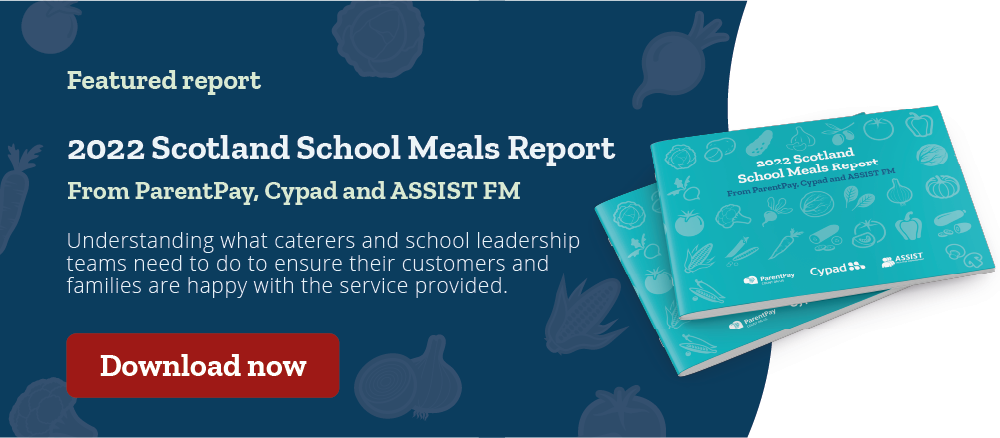Co-written with Nicky Joiner, Catering Co-ordinator, East Renfrewshire Council
ParentPay are pleased to be partnering with ASSIST FM to deliver a collaborative blog series around the provision of school meals in Scotland and beyond. The first of our co-written blogs, More Than A Meal, sets the scene around school meal provision in Scotland and the tireless work that school caterers do to bring schoolchildren nutritious meals.
Alongside this blog series, we recently worked with ASSIST FM to produce our 2022 Scotland School Meals Report; you can download the 2022 Scotland School Meals Report online.
Nicky Joiner, Catering Co-ordinator at East Renfrewshire Council explains that school catering services provide children and young people with high-quality, nutritious school meals every day, but the value they can bring to schools doesn’t end there. Catering teams can help schools to make the most of valuable educational resources that are rarely used to their full potential: school kitchens.
A 2018 Ofsted report found that “Some [primary] schools were [reportedly] constrained by their facilities but 90% of the schools we visited had a full production kitchen. For something that is explicitly set out in the key stage 2 curriculum, the proportion of children being taught to cook is very low”.
Inviting students into school kitchens to learn cooking skills alongside the catering team experts teaches practical life skills as well as helping children to understand fundamentals of food safety and nutrition. It’s also a guaranteed hit with parents: our Scotland School Meals Report found that 89% of parents think cooking should be on the curriculum for all ages, and a further 9% thought it should be included for secondary school pupils.

Teaching children and young people how to cook is a key tool in tackling the obesity crisis. Obesity Action Scotland’s 2021 review found that “23% of Primary 1 children were at risk of overweight or obesity, with 10% specifically at risk of obesity”. This evidenced “no positive progress in reducing obesity rates within the last decade, with 22.4% of Primary 1 pupils in Scotland at risk of overweight or obesity in 2001/02”. Teaching children to cook not only introduces them to a fun activity and teaches essential life skills, but helps to educate them about ingredients, techniques and healthy choices to encourage good habits and positive attitudes towards healthy eating.
Nicky told us that “many local authorities in Scotland deliver cooking classes during the school day, either with pupils and parents or just the pupils…the best way to end a cooking lesson is for the group to sit together and enjoy the meal they have created”. This time is also a great opportunity for the caterers to reinforce the takeaway learnings from the session and answer any questions.

Some Scottish Local Authorities instead choose to deliver cooking classes as one part of the out-of-school holiday programme, in which students also take part in sports and crafts. Nicky explains, “Every day a group of pupils cook the meal for all the pupils attending the holiday programme, learning to make dishes they may not have tried before like macaroni cheese, chicken curry and lentil soup”. The young people that cook for their peers are proud of their achievement, and everyone is given the recipe alongside details of where to purchase fresh and cost-effective ingredients. As an alternative, schools could start a cooking club if cooking is not part of the curriculum, or to encourage the children who show a particular interest or talent in their cookery lessons.
Catering teams can support secondary school pupils even further by giving them the opportunity to work in the school kitchen. They can learn more about the catering industry and the different roles within it, undertake work experience to try a possible career path, and build relationships with staff members which helps them to feel more settled at school.
For more information on school meals in Scotland, download our 2022 Scotland School Meals Report.
